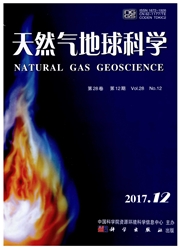

 中文摘要:
中文摘要:
经钻井、二维和三维地震勘探证实,四川盆地川中威远—安岳之间存在一个近南北向展布的裂陷槽,为川中地区的生烃中心,对其进行研究具有非常重要的油气地质意义。在前人研究的基础上,结合最新的地震和钻井资料,依据断层相关褶皱理论对该裂陷槽的形成演化和成因机制进行了分析。分析认为在桐湾二期末,受到拉张作用,基底发育正断层,在正断层相关褶皱作用下,构造发生反转,"隆起"变"凹陷",从而在四川盆地形成大型裂陷槽,结合断层相关褶皱理论分析其成因机制,认为四川盆地受南华纪—震旦纪伸展作用影响,发育多幕裂陷,形成半地堑—坳陷组合,早寒武世,裂陷槽受基底正断层传播作用影响而形成。
 英文摘要:
英文摘要:
It was proved that there was rifting trough which is near north-south direction between Weiyuan and Anyue in Central Sichuan Basin by drilling,2Dand 3Dseismic exploration.The rifting trough is an important hydrocarbon generation center and it is instructive in studying it.In this paper,based on previous researches,the theory of fault related fold is used to discuss and analyze the structure evolution and genesis mechanism of rift trough combined with abundant seismic data and well data in Sichuan Basin.At the end of the second stage of Tongwan Tectonic Movement,basement faults were formed by extensional forces,under the effect of normal fault related folds,the uplift transformed into depression,and the rifting trough formed in Central Sichuan Basin.Based on the analysis of normal fault propagation fold theory,Sichuan Basin was affected by Nanhua Period-Sinian Period extension,developing multi-stage rifting as well as the combination of half-grabens and depressions.Early Cambrian,Weiyuan-Anyue Rift trough is formed by the effect of normal fault propagation.
 同期刊论文项目
同期刊论文项目
 同项目期刊论文
同项目期刊论文
 The seismogenic structure of the 2010 Suining Ms 5.0 Earthquake and Its geometry, kinematics and dyn
The seismogenic structure of the 2010 Suining Ms 5.0 Earthquake and Its geometry, kinematics and dyn Accumulation and distribution of oil and gas controlled by paleo uplift in poly history superimposed
Accumulation and distribution of oil and gas controlled by paleo uplift in poly history superimposed Chemical compositions of detrital feldspars and micas within the Late Triassic and Early Jurassic se
Chemical compositions of detrital feldspars and micas within the Late Triassic and Early Jurassic se 期刊信息
期刊信息
